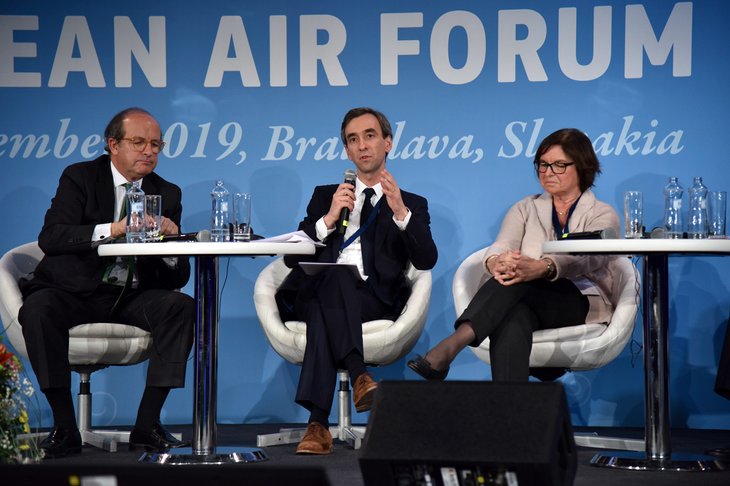Porto took part in the EU Clean Air Forum and demonstrated how the city is improving the Air Quality
Article

Vice-Mayor Filipe Araújo was in Bratislava, capital of Slovakia recently during the EU Clean Air Forum to acknowledge Porto's commitment towards a "Country with Clean Air".
Porto is committed to shaping sustainable long-term urban development and it has laid down a strategy to making the city inclusive, safe, resilient, and sustainable for all.
Filipe Araújo showcased Porto's effective measures to reach its stated strategy, namely the strengthen of the Municipal fleet with electric vehicles; this is the crowning moment of the application process to the Environmental Fund, an important support to the replacement of the municipalities' urban car pool by electric vehicles.
In the framework of the EU funding mechanisms and how they can be used to increase action on and innovation for air quality, panelists discussed experiences and opportunities related to support for research and development, and measures to address emissions, energy performance and energy efficiency in particular.
To get there, Porto and its metropolitan region are leading the way in several matters in the city, regarding mobility, green spaces and the reduction to at least 40% carbon emissions by 2030, in line with the EU climate objectives.
Porto City Hall has presented the largest application to the Environmental Fund, at a national level, to the Ministry of Environment, which was accepted in full, to a total investment of more than 820.000 euros. The state participates with a grant of 341.861 euros.
This is the result of the municipalities' policy to adapt to the changing climate by developing renewable energy sources through social and political changes that involve improving the quality of life for all in the city.
At a local level, as well, this environmental strategy aims to use the city's natural resources wisely, emitting less CO2 and reusing and recycling as much as possible.
On that note, Porto is taking steps forward to have electric buses on the road, by taking on a brand new technology: electrically powered buses. Powering a vehicle with electricity costs less than using diesel or natural gas.
The STCP - Public Transport Company of Porto is looking to replace its diesel buses by an electric fleet, in the framework of the European Consortium FABULOS.EU: the new "E-Bus" make Porto a greener city. Pioneered by Caetano BUS, jointly with Siemens and institutions from Porto University, the eBUS is a bus driven by an electrical motor, which has a capacity for 35 seats and a maximum driving speed of 70 km/h.
The programme's overall financial allocation is 7.8 million euros co-financed by the European Union (90%) as an outright grant.
It is worth mentioning that, in order to encourage greater and better mobility as well as a sustainable environment, tourism transport regulation in Porto has entered into force in April 2017, making Porto the first city in the country to provide a regulatory framework and basis for new policy commitments in this area.
The new tourism traffic regulations apply to vehicle circulation, parking and stopping, use of special infrastructure, the number of hop-on-hop-off buses, tuk-tuks and mini trains on the road. The investment in clean vehicles is mandatory.
Porto is also all about spreading green spaces and fostering sustainable development, by creating more green spaces in the city; this time round it is in the eastern part of Porto, in the framework of the New Intermodal Station of Campanhã Project.
More than 46 thousand square meters of public green space in the eastern part of the city of Porto have already started to work a change: Campanhã will be home to the New Intermodal Station of Campanhã Project, with a comprehensive urban and spacial planning.
The new convergent Intermodal platform in Campanhã will be built under the LEED or Leadership in Energy and Environmental Design, the most extensively used green building rating system at world level. LEED type of building provides a framework to create healthy, highly efficient and cost-saving green buildings and it is an internationally recognized symbol of sustainability achievement.
The territorial and social cohesion of the city was designated as a priority of the current Municipal Executive, with a view to the harmonious development of the entire city territory. In the last three years, the urban planning effort has been focused, in addition to the review of the land-use planning, on the actions to promote urban rehabilitation.
It is a fact that air pollution is still the number one environmental cause of premature deaths in Europe, the EU Clean Air Forum is an important occasion to focus on finding solutions to improve air quality further, tackle air pollution in a productive manner, and engage both communities and businesses to work together.
"This is not a minor issue for Porto and the role cities is worthwhile and it cannot be ignored. Citizens are increasingly aware of these issues and present challenges that we, as politicians, must be able to address", Filipe Araújo stated at the Forum, both in the role of Vice-Mayor of Porto and EUROCITIES representative, as President of the Forum of the Environment.
Filipe Araujo, chair of EUROCITIES Environment Forum and vice president for innovation and environment of Porto City Hall, city of Porto, also stated that "cities have many tools at their disposal to combat climate change - from making use of our public procurement power, to influencing value chains and supporting local stakeholders. Through EUROCITIES and the Covenant of Mayors cities are able to work together to pick up best practice examples to help make this a reality. We need European leaders to recognise these efforts and give cities a seat at the negotiating table when discussing future climate actions."